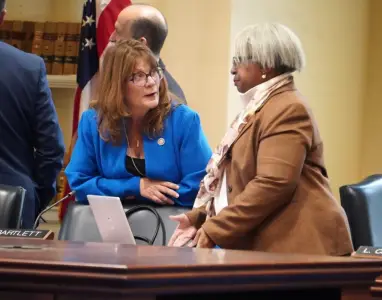Lawmakers look to make old laws on recording relevant in a world of Ring cameras, cellphones

For Del N Scott Phillips D-Baltimore County the debate over Maryland s wiretapping law boiled down to one question We don t require consent for video but we do require consent for audio Does that make sense Phillips required That was just one of the questions during a two-hour briefing Tuesday for the House Judiciary Committee on the wiretapping law as lawmakers consider amending it when the session convenes in less two months Maryland is currently one of only a handful of states that has a two-party consent rule under which everyone in a conversation must agree to it being recorded Under the law a person wjho records another without their permission could face up to five years in prison or up to a fine or both But modern instrument has led to particular tricky interpreations of the law disclosed David Gray a professor at the University of Maryland Francis King Carey School of Law who participated in the briefing He revealed that while a doorbell camera might capture video and audio of an alleged crime the video can be admissible in court under the current law but not the audio My understanding of the history of the law is that it was adopted at a time where video recording was relatively unavailable and so it just wasn t on the minds of the legislature at the time reported Gray who participated in the briefing virtually You re right to recognize that innovation might have overtaken us and trying to write that law now in our current technological climate Gray announced I would not envy you or your staffers There are exceptions to audio and video recordings that are allowed under the law Claire Rossmark an analyst with the Department of Legislative Services and counsel to the Judiciary Committee mentioned they include telephone companies employees calls police body-worn cameras and court-ordered wiretaps for investigative work But lawmakers are looking clarify other carve-outs to the law including in cases of domestic violence or housing discrimination Decree coming back Several bills from the General Assembly are already being eyed for the next session They include House Bill sponsored by Del Robin Grammer Jr R-Baltimore County It would allow any oral or electronic communication to be used as evidence in court if the interest of justice will be served such as protecting domestic violence casualties A companion bill sponsored by Sen William C Smith Jr D-Montgomery passed the Senate unanimously last year but stalled in the House Grammer filed a prefile version of the bill Tuesday Another bill slated to make a return is House Bill sponsored by Del J Sandy Bartlett D-Anne Arundel vice chair of the Judiciary Committee who presided over Tuesday s briefing Her bill would allow a fair housing tester to obtain evidence of any housing violations under the law Sen Charles Sydnor III D-Baltimore County sponsored a Senate version that was approved - in the Senate but did not advance in the House Heather Morton who directs the financial services mechanism and communications campaign with National Conference of State Legislatures mentioned her research did not find any other state with a specific wiretapping exception for fair housing testing programs Morton disclosed her research could not find a law similar to Grammer s HB But she revealed California does let a domestic violence victim seeking a restraining order record confidential communications with an abuser that may be held germane as evidence for that restraining order and for it to be admissible in court Maryland is an outlier Morton mentioned Maryland is just one of states that is a two-party or all-party consent state The majority of states are one-party consent which lets one person record a conversation without needing the other s permission So for example if you re on a phone call with a colleague in a one-party consent state you can record that call without telling the other person or obtaining their consent Morton declared Two attorneys at Tuesday s briefing had differing opinions on what Maryland should do Joyce King chief counsel with the Frederick County State s Attorney s Office noted certain recordings should not need any consent especially when they deal with domestic violence child or elder abuse or other violent crimes Maryland is an outlier she noted These cases are limited to crimes committed against a person that the recording is not just to embarrass or to be salacious not to capture your private conversations at the dinner table It s a material fact of a crime But Baltimore City General Defender Marguerite Lanaux commented two-party consent provides privacy protection from fabricated evidence through artificial intelligence and audio manipulation that helps prevent malicious actors from creating or editing recordings to frame individuals Just because we are in the minority among states doesn t necessarily mean that we need to move to the majority where the majority is in a place that doesn t afford protections that the Constitution is truly rooted in Lanaux revealed After the briefing Bartlett noted one of the key points in assessing the use of two-party consent next year will be the admissibility of evidence to be reviewed by judges They would have all the evidence and they could weigh the evidence and see is this the best evidence Is this evidence going to help prove the material of fact just as they will with any other evidence that gets admitted she noted It was a good briefing to have this discussion Source

